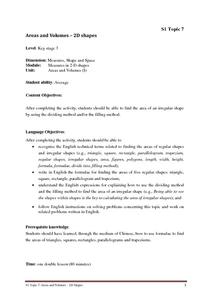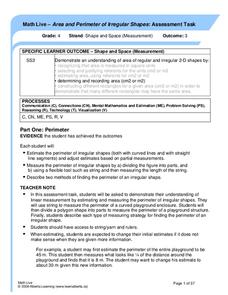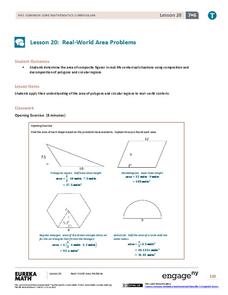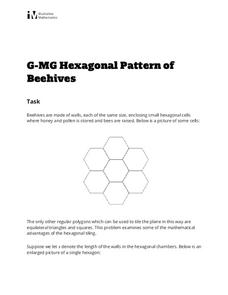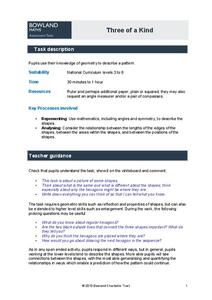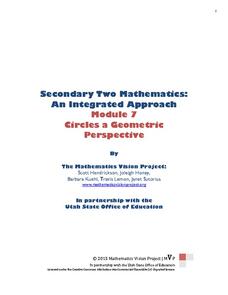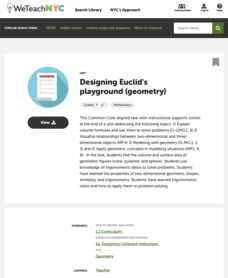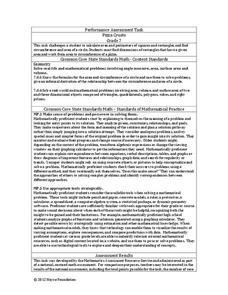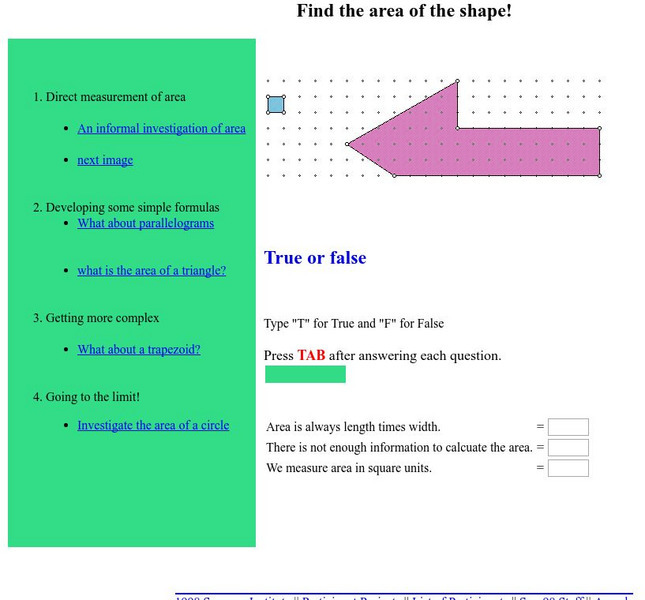Buffalo State
A Five Day Approach to Using Technology and Manipulatives to Explore Area and Perimeter
Young mathematicians build an understanding of area and perimeter with their own two hands in a series of interactive geometry lessons. Through the use of different math manipulatives, children investigate the properties of...
National Security Agency
Awesome Area - Geometry and Measurement
Break out those math manipulatives, it's time to teach about area! Capturing the engagement of young mathematicians, this three-instructional activity series supports children with learning how to measure the area of squares,...
Flipped Math
Unit 9 Review: Area of Polygons
It's time to show what you know! Individuals first review finding the area of polygons using the formulas from parallelograms to regular polygons. They then brush up on finding the area and circumference of circles, as well as reviewing...
Government of Hong Kong
Areas and Volumes - 2D Shapes
Unfortunately for young mathematicians, the world isn't made entirely of parallelograms, triangles, and trapezoids. After first learning the area formulas for these common shapes, students apply this new knowledge to...
Alberta Learning
Area and Perimeter of Irregular Shapes
Evaluate young mathematicians' understanding of area and perimeter with this series of three assessment tasks. Challenging students to not only calculate the area and perimeter of irregular shapes, but to explain in writing their...
Arizona Department of Education
Area and Perimeter of Regular and Irregular Polygons
Extend young mathematicians' understanding of area with a geometry lesson on trapezoids. Building on their prior knowledge of rectangles and triangles, students learn how to calculate the area of trapezoids and other...
EngageNY
Proving the Area of a Disk
Using a similar process from the first lesson in the series of finding area approximations, a measurement resource develops the proof of the area of a circle. The problem set contains a derivation of the proof of the circumference...
Willow Tree
Surface Area of Three-Dimensional Figures
Lateral area and surface area are simple concepts, but calculating them is not as easy! Using formulas, learners calculate lateral area and surface area for the same three-dimensional figures. The resource discusses the formula variables...
EngageNY
Real-World Area Problems
Not all structures take the shape of a polygon. The 21st lesson in a series of 29 shows young mathematicians they can create polygons out of composite shapes. Once they deconstruct the structures, they find the area of the composite figure.
Radford University
The Puppy’s Empire
Dogs can't do math ... but people sure can! A set of five lessons has scholars apply math concepts to solve problems related to buying a new dog, such as designing a fence and a dog house, estimating how large the dog will become, and...
Illustrative Mathematics
Hexagonal Pattern of Beehives
Young geometers and biologists investigate the math of nature in an activity that is just the bee's knees. Participants will study the tessellations of hexagons in a beehive, along with the natural rationale behind the specific shape....
Bowland
Three of a Kind
One is chance, two is a coincidence, three's a pattern. Scholars must determine similarities and differences of a regular hexagon undergoing dilation. They look at lengths, angles, areas, and symmetry.
Mathematics Vision Project
Circles: A Geometric Perspective
Circles are the foundation of many geometric concepts and extensions - a point that is thoroughly driven home in this extensive unit. Fundamental properties of circles are investigated (including sector area, angle measure, and...
Mathematics Vision Project
Module 5: Circles A Geometric Perspective
Circles, circles, everywhere! Pupils learn all about circles, central angles, inscribed angles, circle theorems, arc length, area of sectors, and radian measure using a set of 12 lessons. They then discover volume formulas through...
National Council of Teachers of Mathematics
Improving Archimedes' Method
For this Archmides' method instructional activity, students determine the area of a regular n-gon inscribed in a circle. They use sine and cosine functions to solve problems. This three-page instructional activity contains 4...
New York City Department of Education
Designing Euclid’s Playground
Create a geometric playground. Pupils work through a performance task to demonstrate their ability to use geometric concepts to solve everyday problems. The accompanying engineering design lessons show teachers how the assessment works...
Noyce Foundation
Pizza Crusts
Enough stuffed crust to go around. Pupils calculate the area and perimeter of a variety of pizza shapes, including rectangular and circular. Individuals design rectangular pizzas with a given area to maximize the amount of crust and do...
California Education Partners
Yum Yum Cereal
Design an efficient cereal box. Scholars use set volume criteria to design a cereal box by applying their knowledge of surface area to determine the cost to create the box. They then determine whether their designs will fit on...
Houghton Mifflin Harcourt
Unit 6 Math Vocabulary Cards (Grade 5)
Acute angles, nets, and vertices are only a few terms that a set of flash cards includes. Among the 108 cards, two types are available; word cards printed in bold-faced lettering, and corresponding definition cards equipped with an...
Curated OER
Practice: Word Problems
Congratulations, you've just hit the word problem jackpot! Covering an incredible range of topics from integers and fractions, to percents, geometry, and much more, this collection of worksheets will keep young mathematicians...
Alabama Learning Exchange
"I Saw the Sine"
Discover trigonometric ratios that complement each other. Using two videos, the lesson introduces the trigonometric ratios. The class discovers the relationship between the sine and cosine of complementary angles.
Texas Education Agency
Texas Gateway: Determining Area: Regular Polygons and Circles
The student will apply the formula for the area of regular polygons to solve problems.
Math Open Reference
Math Open Reference: Polygons
Get the definition and properties of a polygon. Then explore such topics as: 1) types of polygon 2) area 3) Perimeter 4) angles associated with polygons and 5) names of polygons.
National Council of Teachers of Mathematics
The Math Forum: Find the Area of the Shape!
Try to figure out the area of this challenging shape. In order to view the images, you will need to use JavaSketchpad.



